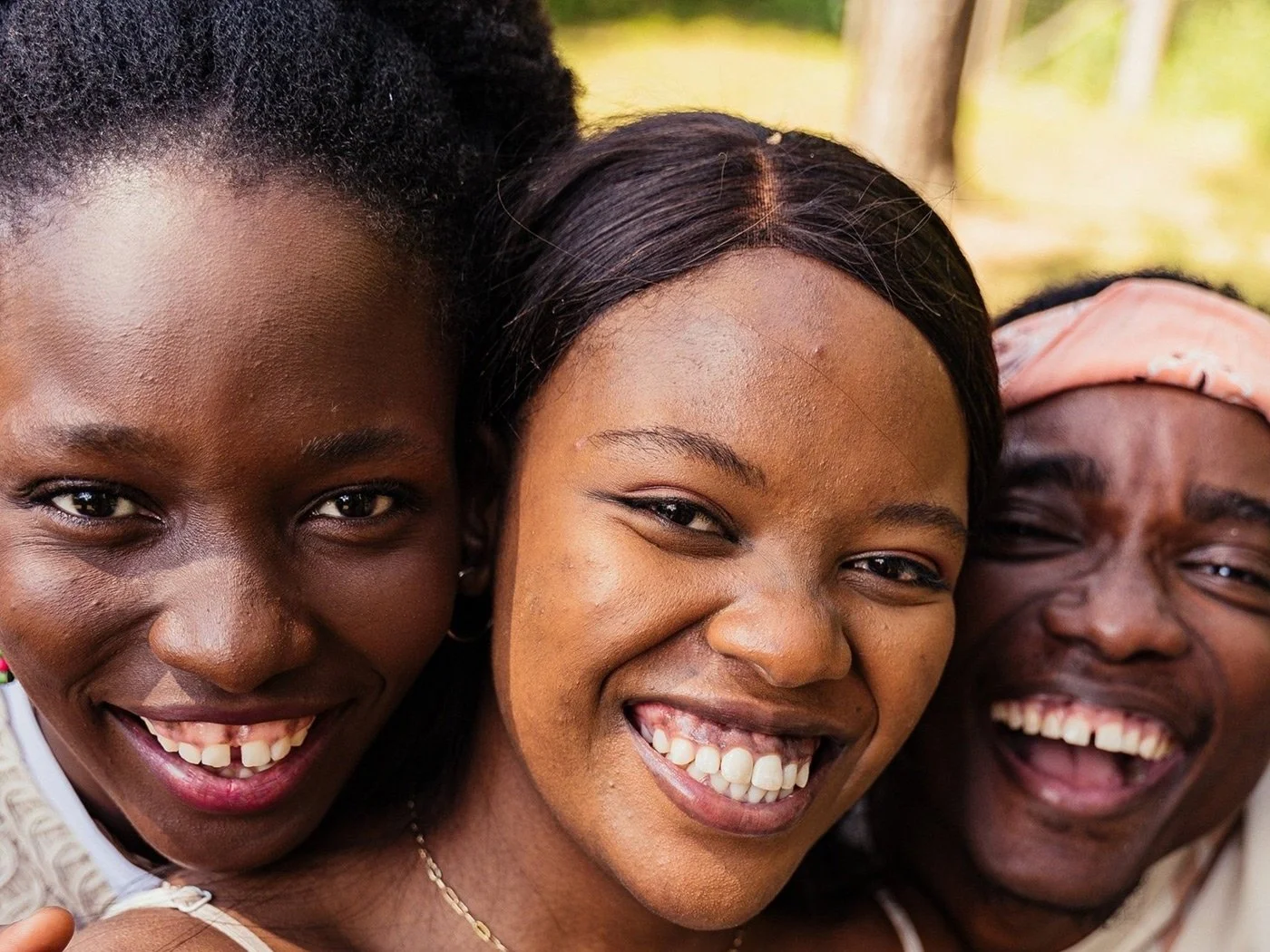When we prioritize our mental health, we can enjoy a clearer mind, a better sense of self, improved productivity and an increased capacity to manage unexpected change. The best part: Making adjustments to your daily life doesn't have to be difficult. Mental health experts weigh in to share practical ways to make your mental health your priority…
Humor Doesn't Heal, But Sometimes Joy Can Help
Laughter is a way to express pleasure or display our sense of humor. We laugh when things are funny, we laugh when we're experiencing joy, and we laugh when we see our experiences reflected back in a new way. Laughter can help us release tension in a moment of anger or lift us out of the sinking feeling of sadness.
Expressing Love Beyond Your Valentine
Each February we celebrate love, and Valentine's Day is a great reminder that we often take for granted the love in our lives. But It's important to remember that romantic love isn’t the only love that deserves our attention. There are many kinds of loving relationships that often get forgotten about in the rush to have a picture-perfect evening with a special someone. Having a romantic love in your life is worth celebrating, but what about all the other forms of love? How can we normalize and prioritize various forms of loving relationships?
The Grief We Don’t Acknowledge is Still Real
The Grief Toll of Breast Cancer Hits Different During a Pandemic
By Yolande Clark-Jackson
You either know someone who has fought breast cancer or you know someone who fought beside someone with it. And, if you have lost a loved one to breast cancer, you know all too well the grief that follows. There is sadness, but there is also anger. If you have lost someone to breast cancer, you want to know why. Why didn’t the treatment work? Why haven’t they found a cure yet? Why my friend, cousin, mother, auntie or sister? It is normal to question why and to experience a range of emotions when someone you care about dies. It is normal to grieve what we have lost.
Each year one and eight women are diagnosed with breast cancer. And, according to The National Library of Medicine, Black women are twice as likely to die from breast cancer than white women regardless of the stage of the cancer. This disparity is scary. And, although rare, men can also be diagnosed with breast cancer, and some do not survive their diagnosis.
Each October a pink ribbon reminds us of the impact the disease has made on families and communities. But, because of various medical and social disparities, Black communities are hit the hardest. And, for the past two years, the pandemic has increased the grief around breast cancer and has taken a toll on those battling the disease as well as their caregivers. It has taken a toll on the communities in which they belong.
The Pandemic Makes Matters Worse
The pandemic has taken away so much of what used to be normal, but in 2020 it also took away the ability for some to feel safe to leave the house to get mammograms. Most didn’t want to go out of their home to the grocery store, so it is unlikely those same people would want to risk getting covid to see if they could possibly have cancer.
As of October of 2021, worldwide over 4 million people have died from Covid-19. Most of us have already lost family members, friends, or coworkers to coronavirus, and we are still grieving those losses, so the added fear and grief around receiving a cancer diagnosis could reel someone into emotional distress.
Treatment for Breast Cancer Often Leads to Adverse Effects
Those who receive a breast cancer diagnosis have to receive treatment. This involves either chemotherapy or radiation which often equals side effects that are both physical and emotional. The changes that happen in the body and mind can add additional stress on an entire family. Those who fall into depression and experience feelings of hopelessness often lose the desire and ability to take good care of themselves. According to the American Psychological Association, research shows that women with depression are less likely to survive a breast cancer diagnosis. Depression takes a toll on an entire family. Those who care for loved ones with a breast cancer diagnosis also need emotional support.
Caregivers Need Support Too
When you care for a loved one battling cancer, you already begin feeling grief for the loss of the way things used to be. You grieve the loss of the time before the diagnosis, the appointments, and the fear. You know you need to be strong for your loved one, but you don’t always feel strong. You often feel exhausted with fear and worry. If you are a caregiver, you may be working to manage feelings of stress and waves of sadness. You may need support to help you maintain your mental and emotional health. You may need help finding the right language and tools to support your loved ones when they are feeling scared, frustrated, or sad. You may also need to seek out professional help and call on your community for support.
What We Can Do in Our Own Communities
As a community, there are things we can do to support our friends and loved ones battling breast cancer.
We can acknowledge that our friend or loved one is experiencing a difficult time and that it is compounded by living in a pandemic
We can listen. Sometimes being a good listener when someone is experiencing feelings of overwhelm can be the support our friends or loved one need at the moment.
We can encourage them to seek mental health services so they can get the long-term and consistent professional support they need to help get them through.
This month, as we raise awareness about breast cancer, let us remember those who are in the fight for their lives during one of the most difficult times in our history. And, let us remember to celebrate breast cancer survivors and their loved ones who support them.
At Ibisanmi Relational Health we are here to support you and your loved one affected by breast cancer. Book a 15-minute consultation here.
And, be sure to follow us on IG at @ibisanmi.relational for mental health check ins and inspirational posts.
The Emotional Tax of Racial Trauma
By Yolanda Jackson
While the whole world manages health concerns related to the pandemic, African Americans and Asian Americans have the extra burden of trauma due to racialized violence. After the March 19th shooting in an Atlanta spa and six Asian women dead, people were again reminded of the evil that was always present. How do we deal in society that continues to harm People of Color? How do we manage in a society that requires a mass shooting or knee on a neck to see the horror and effects of white supremacy?
Asian Americans have been under attack since the pandemic. According to NBC news, there were 3,800 racial incidents reported by Asian Americans over the past year. Over 500 during the first three months of 2021. Now, Black Lives Matter and other Black organizations are publicly standing in solidarity with Asians and Asian Americans against Asian Hate crimes. Black people are once again, standing in solidarity even when our own mental health is at risk.
African Americans Live with Racialized Trauma
Because African Americans have suffered multiple traumas due to discrimination, hate crimes, and police brutality, seeing Asians and American Asians publicly attacked causes Black communities to share the stress of their racialized trauma.
As racialized violence continues to plague the African American community, it is impossible to avoid being triggered by hate crimes committed against other groups. It is also common to experience a range of emotions in response. According to the American Psychological Association, a 2019 study stated, “Similar to post traumatic stress disorder, racial trauma is unique in that it involves ongoing individual and collective injury due to exposure and re-exposure to race-based stress.”
So how do we show up for Asian and Asian Americans?
African Americans have not always felt supported by Asian Americans which has led to feelings of resentment and isolation. Yet, witnessing violence against Asian Americans has triggered their own racial trauma.
When stressed, it may be difficult to show up for another group when still seeking solace and support for your own community. It may also be difficult to find the tools to assist in the unification against all other racial violence when you have not attended to the impact of past, present and collective traumas. But, as Dr. Martin Luther King said, “Injustice anywhere is a threat to justice everywhere.” So, as we do the work to heal our communities, we must work to support one another.
We Must Heal Our Communities of Color
Communities of Color need mental health support. Without the tools to process racialized trauma, it is easy to fall into depression. It is also easy to forget that all communities of color are victims of white supremacy. Being aware of your mental, emotional, and relational needs will allow you to identify the types of support you need during these difficult times.
In these times, you must address your mental, emotional, and relational needs.
Mental needs:
A space for you to process your thoughts and to breathe
Name and acknowledge the impact of white supremacy
Acknowledge that racism and racial trauma are real
Be aware of the effects of racial trauma on your body, mind and spirit
Emotional needs:
Allow yourself to be and for your emotions to flow
Let yourself know that it’s okay to cry, be enrage, frustrated, numb, exhausted, etc., because of the white supremacy and its deadly impact on your life and the lives of communities of Color
Move your emotions by speaking, writing, drawing, walking, dancing, cooking, exercising
Validate your fears, anxieties, grief and painful experiences with racism and racial trauma
Relational needs:
Support from the people and communities who see, love you and affirm your worth
Connect with your families and friends
Connect with the resilience of those ancestors and elders who came back you to affirm your dignity and humanity, in the face of white terror and supremacy
Connect with communities who are authentically working to dismantle white supremacy and its racialized trauma on us all
In addition to all these needs, seeking out professional health for your mental, emotional and relational well-being is always important. Particularly, finding a culturally affirming therapist to discuss and process racial trauma is essential. At Ibisanmi Relational Health, we’re available to help you journey the pain and the grief from racialized trauma. You can book your 15-minute consultation here.
And be sure to follow us on IG at @ibisanmi for mental health check ins and inspirations.









When we prioritize our mental health, we can enjoy a clearer mind, a better sense of self, improved productivity and an increased capacity to manage unexpected change. The best part: Making adjustments to your daily life doesn't have to be difficult. Mental health experts weigh in to share practical ways to make your mental health your priority…